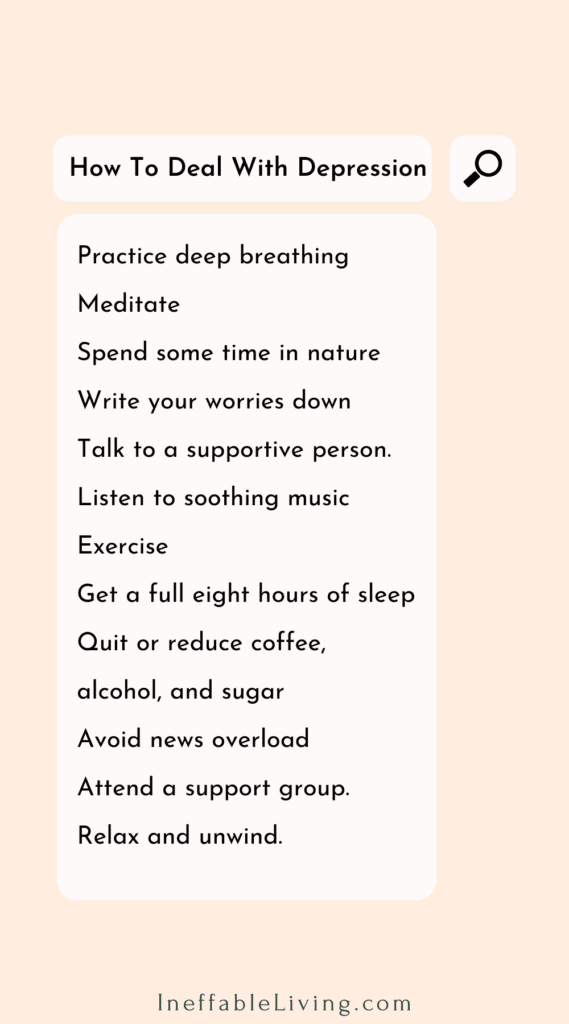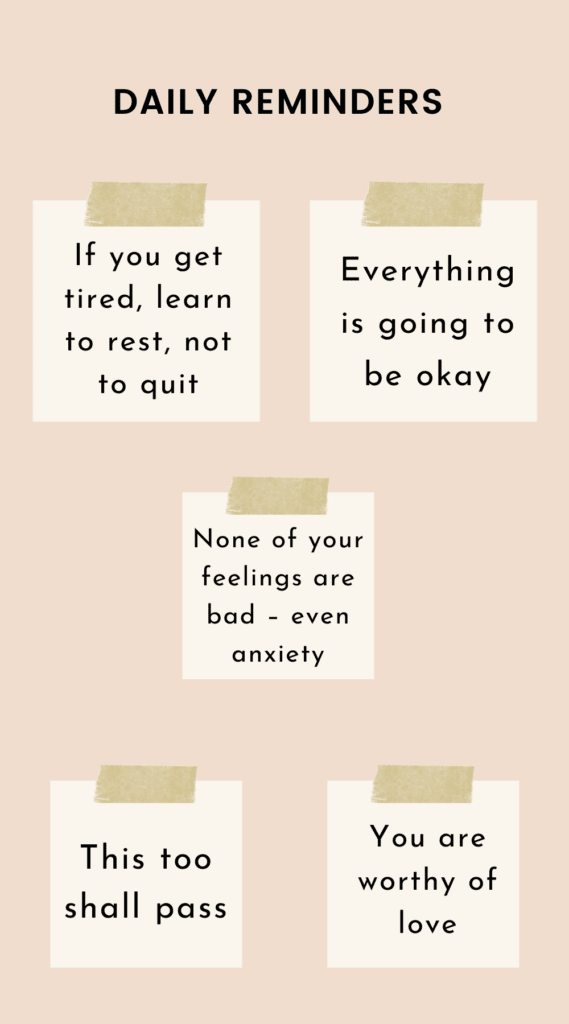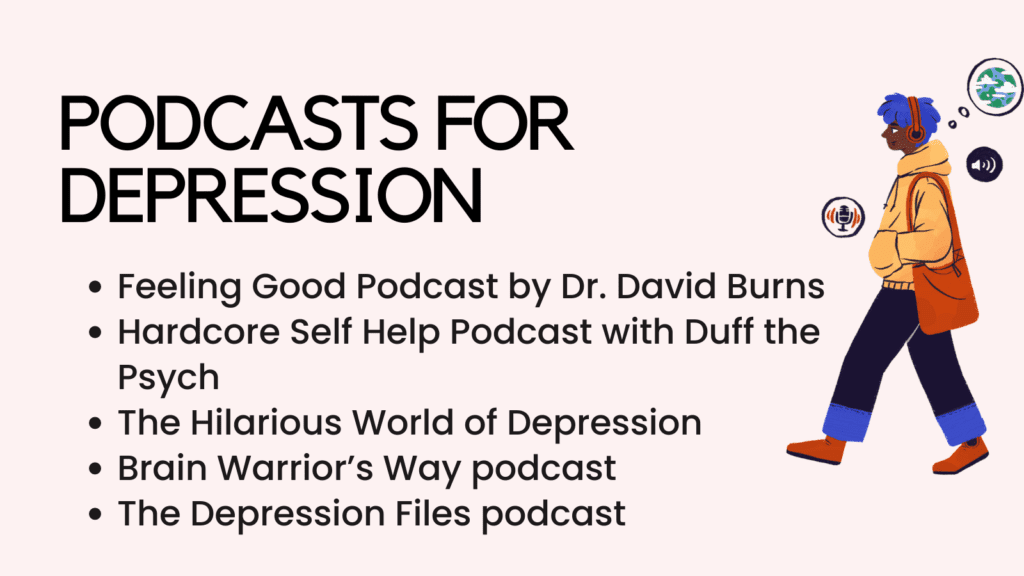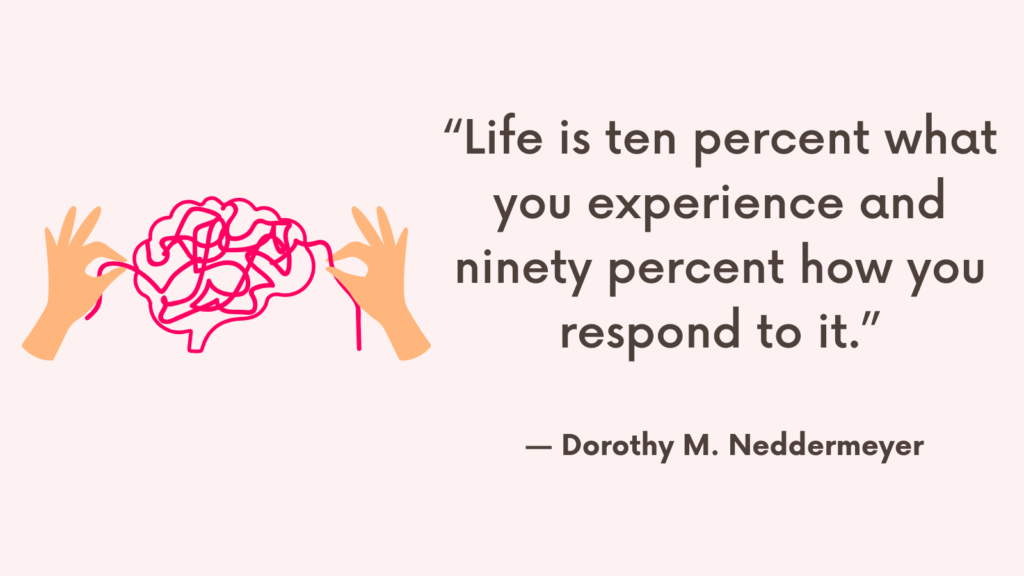This post contains high functioning depression test along with effective tips on how to overcome it.
High functioning depression, also called invisible depression, hidden depression, “smiling” depression, or concealed depression, is not a mental disorder for which you can receive a diagnosis from a doctor or a therapist. It’s a syndrome, or a set of characteristics that suggest a certain disorder or problem. (*)
Two of the main symptoms of clinical depression are a noticeably depressed mood and lack of feelings of pleasure in normally pleasurable activities.
When you focus on counting your blessings and avoid expressing or even admitting painful feelings, then you might be using perfectionism to hide your depression.
This is why a highly functioning person can be invisibly suffering from depression.
What Is Clinical Depression?
Clinical depression is mainly characterized by a melancholy mood that usually lasts for several days, ranging from moderate to severe. (*)
According to the DSM-5 (American Psychiatric Association 2013), symptoms of clinical depression must include at least one of these primary criteria:
* A noticeably depressed mood for all or most of the day
* Anhedonia – inability to feel pleasure in normally pleasurable activities.
Along with four of these additional criteria:
* Foggy thinking or indecisiveness
* Fatigue, agitation or irritation
* Sleep and appetite disturbance
* Problems with goal setting
* A general slowing down of mental and physical activity
* Feelings of hopelessness or helplessness
* Feelings of low self-esteem and worthlessness
* Thoughts of self-harm
Moderate depression is when symptoms of depression are present for two years in adults, and for one year in children.
To be diagnosed with severe depression symptoms need only be present for two weeks but must cause major impairment.
What Is High Functioning Depression?
Most people are not sad and are capable of functioning well and have no apparent reasons to be depressed and yet many feel down or hopeless.
This happens when the person experiences an emotional denial or detachment, in which shame, trauma, hurt, or anger are kept under wraps. (*)
High Functioning Depression Test
The following questions represent common signs of high functioning depression:
Results
#1. Are you are a perfectionist?
#2. Do you often struggle with a constant, critical inner voice?
#3. Do you constantly worry and feel the need to control yourself and your environment?
#4. Do you overly focus on the well-being of others but won’t allow them into your inner world?
#5. Do you often detach from painful emotions and actively try to suppress or shut them off?
#6. Do you constantly keep yourself busy and use accomplishments to feel valuable?
#7. Do you strongly believe strongly in counting your blessings while discounting your pain and struggling to show yourself compassion?
We will not sell your information. All results are kept confidential.
This quiz is for informational purposes only. It is not meant as a diagnostic or assessment tool.
Results
The questions above represent common signs of high functioning depression. If you answered yes to most of these questions, then high functioning depression may be a problem for you.
FREE Depression Worksheets
Healthy Coping vs. High Functioning Depression
One of the main reasons why depression can be hidden is because it can mask itself as “healthy coping.”
1. Healthy Coping
As we grow up, we start learning and gathering certain skills and strength that we use when we need them, such as anger management and self-soothing skills.
These coping skills, whether they were healthy or not, help you deal with life.
Healthy coping happens when you use healthy, constructive skills to deal with whatever comes your way
Healthy coping can involve compartmentalization of feelings, as you tend to the more pressing things. But when it’s safe and you have the energy and time, you connect with those feelings, good or bad.
How do we learn to compartmentalize?
Healthy parenting model and teach children soothing skills, that help them learn that feeling sad or hurt is tolerable, and that there’s a time and a place to express them.
Related: Regulate Your Emotions: How To Manage and Control Your Difficult Emotions?
2. High Functioning Depression
If your coping skills are healthy, you learn that you can’t get over pain if you won’t connect with your strong thoughts, experiences, and emotions.
But if you struggle with high functioning depression, your logic might be backward – you believe that you’ll break down if you admit vulnerability or hurt.
Allowing Yourself To Feel Your Emotions
Our emotions can be messy, inconvenient, and even confusing. They oftentimes make us do things we wish we hadn’t done. It’s no wonder our emotions scare us sometimes.
Although most of us believe that our feelings and deserve to be addressed respectfully and fully, we also think of emotions as being disruptive and unproductive—at home, at work, and everywhere else.
However, the more we ignore our feelings, or suppress them, the stronger they become. Difficult emotions don’t heal themselves. If we don’t express our emotions, they build up inside us, until they eventually become too heavy to carry any further.
How Did You Go Numb?
We go numb inside when we lose the ability to even identify what we’re feeling. When that happens, we become unable to understand why we’re experiencing an emotion, which creates even more confusion.
And when we’re unable to identify, understand, or put into words what we feel, we can’t do anything about it. It becomes impossible to master our feelings and learn to make them work for us, not against us.
One of the main reasons we go numb inside is growing up in homes where everyday emotional issues were ignored – no one had ever talked about them or taken actions to address them.
In a way, your life didn’t have to be tragic for you to struggle with your difficult emotions.
Related: How to Become Emotionally Sober? 3 Steps to Successfully Move on After Addiction
Emotions Serve A Purpose
Think of difficult emotions as the emotional equivalent of physical pain. It’s inconvenient, but it serves a purpose. Physical pain sends a powerful signal that something is wrong, nudging you to take action of some kind.
Without physical pain, you wouldn’t do consult your doctor or paid attention to whatever might have caused your pain. Your situation could have gotten worse, potentially leading to a premature death.
Emotions work the same way. They send a signal that something is wrong. Perhaps, you need to let go of some toxic relationships, change your job, or change your thinking pattern that creates suffering in your life.
Anxiety nudges us to improve things that a more positive mood might be willing to accept.
Even anger can be a great motivator, driving us to act and perhaps to fix what made us angry in the first place.
Pessimism makes it easier for us to anticipate things that could go wrong and make plans to prevent them.
Guilt acts as a moral compass, nudging us to apologize and fix our mistakes and prevent making that same mistake in the future.
How To Overcome High Functioning Depression? Effective 3-Step Guide
Step 1. Increase Self-Awareness
1. Increase Awareness About The Problem
You have to identify a problem as a problem if you want to change it.
Your hiding behaviors may have been intentional for some time. You may know how and why they started.
After a while, your hiding might have became so entrenched that it became unconscious.
2. Overcome Denial
Even when you recognize some hiding behaviors, you might not realize how that behavior is doing more harm than good.
For instance, if you identify with perfectionism which a constant, critical voice, you’re likely to argue that the voice is helping you function and keep the quality of my work where you need it to be and isn’t toxic. Why would you change that?
That’s denial talking.

3. Practice Mindfulness
Mindfulness helps you deepen your experience of the present.
It helps you turn off the autopilot mode in which you operate so much of the time—brooding about the past or worrying about the future—and instead turn in to things as they are in the present.
It’s only when you sit with emotions and give them space in the present that you can experience full emotional expression.
Related: 15 Easy Mindfulness Activities to Help You Deal With Anxiety, Depression, and Trauma
4. Make a Commitment
The experience of feeling your emotions might seem frightening and very intense. Your high-functioning depression might argue that if you felt pain, it might never go away.
You are going to feel worse before you can feel better – this is how change occurs.
It’s normal to feel discomfort, agitation, and confusion when you begin to get in touch with your emotions and challenge familiar belief systems, but remind yourself that this won’t last forever, and that eventually, you’ll feel so much better down the road.
Make a commitment to be willing to give the time and effort it takes to become deeply connected with your inner thoughts and emotions.

Step 2. Confront Your Old Coping Skills
Using the skill of mindfulness and awareness, you’re going to confront your old rules that may have previously been necessary for your emotional survival.
These rules include your “must do” and “never do” lists that have governed your life and created the disconnection you’re feeling now.
Begin to identify whether a rule or belief is helpful and helps you lead a fulfilling life, and so is to keep, or is helping and so needs to be challenged and replaced with a more helpful rule or belief.
How to Evaluate Your Beliefs?
1. Identify the beliefs That Underlie Your Actions (or Lack of Action)
For instance, if you were abused, or neglected, you might have absorbed critical messages about what you should believe about yourself and about others.
You might think, I deserved what I got… It was my fault..I am unlovable.
2: Decide Whether Each Belief Is helpful
This step can be hard as your thoughts could be so distorted that they seem fine to you.
So a good way to decide whether a belief is helpful or not is to ask yourself, Would I teach this belief to a dear friend? Or to my child?
If the answer is a resounding No! then that’s a clue that you shouldn’t be applying it to yourself either.
3: Replace Old Destructive Beliefs with New Constructive Ones
Oftentimes, this takes risking a behavior change before you can challenge an old belief and replace it.
For instance, if you believe crying in front of people is a sign of weakness and a risk that you might get hurt, you might need to find the courage to cry in front of someone before you can realize that being vulnerable helps bond relationships and a good way to receive support.
Step 3. Connect with Emotional Pain for Healing
Connecting with your emotions can be an intense experience. This is why you’re going to need tools to help you with that:
1. Compassion—Be Empathetic Towards Yourself
For most of us, it’s easier to compassionate towards other people than it is towards ourselves.
Self-compassion means extending kindness and generosity toward yourself, without judgment.
2. Acknowledgment—Recognize the Lessons You Learned
Acknowledging your past lessons isn’t about blame – it is recognizing that something existed or exists, whether intentional or unintentional, positive or painful.
For instance, if your father walked away when you were a child, the message you’d learn might be “People you love can disappear from my life,” or “If I love, I can get hurt.”
Ask yourself the following questions about each painful memory:
* What message did I receive from this experience about myself or about life?
* What did I come to believe about my capability of being loved, safe, and valued from this experience?
3. Mindfulness—Be Present with Your Emotions
Allowing yourself to feel any emotion deeply may be hard for you.
But to fully acknowledge the messages you received, you need to also allow your emotions to come to the surface and feel the message’s emotional impact, be it positive or negative.
If the emotions are painfully strong and it’s hard to be present with them, try the following:
* Visualize a place where you feel safe and go there in your mind.
* Use meditation to not fuel the pain but to simply notice it and let it go.
* Find safety through writing by giving your emotions shape and form, or a beginning and an end.
* Ask a safe person to be with you and to be there for you.

Conclusion
When perfectionism is the way you’ve survived, it can be hard to believe that vulnerability and allowing yourself to feel your emotions, especially the painful ones, will lead to a greater sense of security and well-being.
But it’s only when you sit with your fears and risk allowing your emotions to come to the surface, that fear loses its power to control you.

FAQ
What Can I Do If I Don’t Feel Very Much?
Not feeling is a defense mechanism people usually develop in childhood to avoid feelings of pain and helplessness.
If you have trouble getting in touch with your emotions, close your eyes and focus on your chest and belly area as you take a deep breath into your belly.
Pay attention to the flow of your breath. Is your belly relaxed? Is your heart calm? What other sensations can you feel?
If you still don’t feel anything, try to focus on what “nothing” feels like. Then try to feel out whether “something” might be hiding behind the “nothing” sensation.
Paying better attention to your physical sensations can help you practice feeling.
Throughout the day, try to pause for a few minutes and direct your attention to the question: How do I feel right now?
Are there any specific triggers for high functioning depression?
The triggers for high functioning depression can vary from person to person, and it is important to remember that each individual’s experience may be unique.
However, there are some common factors that may contribute to the development or exacerbation of high functioning depression. Here are a few potential triggers:
1. Stressful life events
Traumatic experiences, such as loss of a loved one, financial difficulties, relationship problems, or major life transitions, can trigger or worsen high functioning depression.
These events can overwhelm individuals, causing them to internalize their emotions and exacerbating their depressive symptoms.
2. Personal or societal expectations
The pressure to meet personal or societal expectations, such as academic achievement, career success, or maintaining a certain image, can contribute to high functioning depression.
Striving for perfection or constantly comparing oneself to others can create intense feelings of inadequacy and fuel depressive tendencies.
3. Biological factors
Some individuals may have a biological predisposition to depression due to factors such as genetics, hormonal imbalances, or neurotransmitter abnormalities.
These biological factors can make individuals more susceptible to developing high functioning depression when they encounter additional stressors.
4. Childhood experiences
Adverse childhood experiences, such as neglect, abuse, or unstable family environments, can increase the risk of developing high functioning depression later in life.
These early traumas can impact one’s ability to cope with stress, regulate emotions, and maintain healthy relationships.
5. Chronic illness or pain
Living with a chronic illness or experiencing chronic pain can significantly contribute to feelings of sadness, hopelessness, and frustration, potentially triggering or worsening high functioning depression.
It is important to remember that these triggers can interact with one another, and not everyone will experience the same triggers or respond to them in the same way.
What are some common misconceptions about high functioning depression?
1. Misconception: “If someone is high-functioning, they can’t be depressed.”
Reality: High-functioning depression refers to individuals who outwardly appear capable and successful, but internally struggle with depressive symptoms.
They may excel in their careers or relationships while silently battling with depression.
2. Misconception: “High-functioning depression isn’t as severe as other forms of depression.”
Reality: High-functioning depression can be just as debilitating and distressing as any other form of depression.
While individuals may maintain their daily routines and responsibilities, the internal emotional struggle can be significant and impact their overall well-being.
3. Misconception: “People with high-functioning depression should just ‘snap out of it’ or ‘think positive.'”
Reality: Depression is a complex mental health condition that cannot simply be overcome through willpower or positive thinking.
It requires professional help, support, and appropriate treatment strategies to manage and heal from its effects.
4. Misconception: “External success or achievements indicate happiness and mental well-being.”
Reality: External appearances do not always reflect one’s inner emotional state.
Individuals with high-functioning depression may excel professionally or socially, but this does not mean that they are immune to mental health struggles.
How can I support someone with high functioning depression?
Supporting someone with high-functioning depression can be a crucial source of help and comfort.
Here are some scientific suggestions to assist you in providing support:
1. Educate yourself: Learn about high-functioning depression, its symptoms, and how it can manifest in individuals. Understanding the condition will enable you to provide more informed and empathetic support.
2. Communicate openly and non-judgmentally: Create a safe space where they feel comfortable expressing their feelings without fear of judgment. Practice active listening and avoid offering unsolicited advice or dismissing their experiences.
3. Offer empathy and validation: Validate their emotions and experiences by acknowledging their struggles. Avoid minimizing their feelings, even if they seem to be coping well externally. Let them know you believe their experiences and that it is okay to not be okay.
4. Encourage professional help: Suggest that they seek professional support from a psychologist or mental health counselor experienced in depression. Therapy sessions can help them explore their emotions, learn coping strategies, and develop healthier ways of managing their symptoms.
5. Support self-care practices: Encourage the person to prioritize self-care activities. This may include engaging in regular exercise, maintaining a balanced diet, getting enough sleep, and practicing stress reduction techniques such as meditation or relaxation exercises.
6. Be patient and understanding: Recognize that recovery takes time and setbacks are common. Avoid pressuring them to “snap out” of their depression or expecting immediate improvements. Patiently support them throughout their journey.
7. Offer practical assistance: Help with everyday tasks or responsibilities that may feel overwhelming for someone with high-functioning depression. This could involve assisting with household chores, childcare, or accompanying them to appointments if needed.
8. Stay connected: Check in regularly with the person to show your support and let them know you’re there for them. Social isolation can worsen depressive symptoms, so maintaining connections is vital.
Remember, it’s essential to respect their autonomy and boundaries. If they express a need for space, honor that while still reassuring them of your availability.
Encouraging them to seek professional guidance is crucial for long-term management and support.
Are there any warning signs that indicate a need for immediate professional help?
Yes, there are warning signs that may indicate a need for immediate professional help when it comes to high-functioning depression.
It’s important to remember that everyone’s experience with depression is unique, and these signs may vary from person to person. Here are some potential indicators:
1. Suicidal thoughts or ideation: If the person expresses thoughts of self-harm or suicide, it’s crucial to take these statements seriously. Urgently seek help by contacting a mental health professional or a helpline in your country.
2. Inability to function in daily life: If the person’s depression symptoms significantly impede their ability to carry out their daily responsibilities, such as work, school, or personal care, professional intervention may be necessary.
3. Persistent and intense feelings of hopelessness: If the individual consistently expresses feelings of hopelessness, despair, or a belief that things will never improve, professional support is vital.
4. Self-destructive behaviors: Engaging in self-destructive behaviors, such as excessive substance use, reckless activities, or self-harming behaviors, can be an indication that immediate professional help is needed.
5. Sudden changes in mood or behavior: If you notice abrupt and drastic changes in a person’s mood, behavior, or appearance, particularly if they become more withdrawn or socially isolated, it may be an indicator that professional assistance is required.
6. Physical symptoms: Chronic fatigue, appetite and sleep disturbances, unexplained physical pain, or other somatic complaints can be signs of severe depression. If these symptoms persist and significantly impact daily functioning, professional help should be sought.
If you observe any of these warning signs, it’s crucial to encourage the person to reach out to a mental health professional as soon as possible.
If they are unwilling or unable to seek help, you should consider involving a trusted family member, friend, or contacting emergency services to ensure their safety and well-being.

Resources
- Portions of this article were adapted from the book Perfectly Hidden Depression, © 2019 by Margaret Robinson Rutherford. All rights reserved.
- Portions of this article were adapted from the book Permission to Feel, © 2019 by Marc Brackett. All rights reserved.
- Frontiers | Objective Methods for Reliable Detection of Concealed Depression (frontiersin.org)
- Hidden Depression: What It Is and How to Help (healthline.com)
- Hidden signs of depression: How to spot them and what to do (medicalnewstoday.com)
- Understanding masked depression: A Clinical scenario – PMC (nih.gov)
- 8 Hidden Signs of Depression and How to Spot Them | Psych Central







